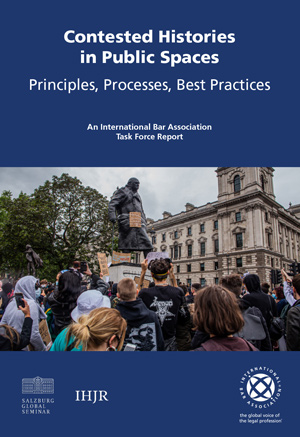The International Bar Association (IBA), in collaboration with the Institute for Historical Justice and Reconciliation (IHJR) in The Hague and Salzburg Global Seminar, has published the first international study of its kind into disputes over statues, monuments, buildings and street names. Contested Histories in Public Spaces: Principles, Processes, Best Practices presents ten in-depth case studies that examine the complex political, social, cultural, and legal dimensions of these contestations.
The report was launched with a webinar discussion on 11 February 2021, at 17h00 GMT. Click here to watch a recording of the launch.
Three years in the making, the undertaking, in 2017, of the research that is the bedrock of this new report was prescient given how controversies around statues have come to the fore in recent times, including the toppling of the Edward Colston statue in Bristol and that of Cecil Rhodes in Cape Town.
Drawing on more than 230 contestations in Africa, the Americas, Asia, Australia and Europe, this landmark report is intended to help guide policy planners and decision-makers in addressing disputes over contested historical legacies in public spaces.The project was overseen by an international Task Force of eminent academics and practitioners.
IBA President Sternford Moyo, said: ‘Common to all the cases considered is the rule of law. As the IBA report observes: “The cases raise myriad questions about the relationship between historical legacies, legal protections and political processes. How does one balance municipal authority with national legislation? What is the role of local and national politics in determining the outcome? What recourse exists when heritage protection legislation is ignored or circumvented for the sake of local sensitivities? What measures exist for communities, states, nations, and even international frameworks in enforcing legal norms?” These are hugely important questions, and this report could not be more timely.’
Dr Mark Ellis, IBA Executive Director and Contested Histories Task Force Member, said of the report: ‘It is our goal to provide future decision-makers with a set of principles and potential guidelines for responding to these contestations in an effective and responsible manner, and, most importantly, within the framework of existing legislation or local ordinances.’
The killing of George Floyd by police in Minneapolis, Minnesota, on 25 May 2020, led to mass protests across the world, often characterised by attacks on monuments and the toppling of statues. This report seeks to aid understanding as to why these historical legacies are so often the focus of public protest. It also explores the complex social, political and legal dynamics involved in such debates, including:
-
How a dispute over an equestrian monument of Robert E Lee, in Charlottesville, became entangled in a judicial process that resulted in violent protest and tragic loss of life.
-
Why a statue of Cecil Rhodes at the University of Cape Town fell after thirty days of student protest, but a Cecil Rhodes statue at Oxford University still stands.
-
How the toppling and dunking of the Edward Colston statue in Bristol Harbour was viewed by some officials as a criminal act of public vandalism and by others as an understandable act of historic vindication.
-
Why a ‘comfort women’ statue in Seoul disrupted diplomatic relations in East Asia and found its way into an amicus curiae brief at the United States Supreme Court.
Dr Timothy W Ryback, Director and Co-founder of the Institute for Historical Justice and Reconciliation, and editor of the report, said: ‘With the ambition of presenting lessons from around the world, we selected ten iconic cases from across Africa, the Americas, Asia and Australia as well as Europe. Learning from the experience of others is the true value of this volume. As important as doing the right thing, is not doing the wrong thing.’
Jeffrey Golden, Joint Head of Chambers, 3 Hare Court, and Contested Histories Task Force member, commented: ‘Public space is valuable space and, by definition, shared. In an ideal world, allocation of that space and the names and representations that adorn it should project a sense of inclusiveness, through historical legacies that reflect the diversity and multiple perspectives of those who share it. It is incumbent on officials responsible for public spaces to help shape a commemorative landscape that is both representative and inclusive’.
The report explores key questions that policy planners and decision-makers need to ask when seeking to resolve disputed historical legacies in public spaces:
-
What triggered the contestation, for example political or social change, a single event, or social media?
-
How does the contested object ‘interact’ with collateral spaces? What is the signalling of its iconography?
-
What is the range of remedies available: contextualisation, placarding, resignification, counter monument, relocation, removal, or destruction?
-
What are the legal constraints to potential remedies? Local ordinances, state or provincial law, national legislation, or international conventions?
-
What are the deeper societal or political issues that precipitated the dispute, such as historical injustices, systemic discrimination, inequalities, and so on?
The Chair of the Contested Histories Task Force Baroness Usha Prashar of Runnymede, CBE, a crossbench member of the House of Lords, writes in the Preface: ‘Pervasive attacks on public monuments are generally symptoms of more profound changes in a society, whether they be political transitions, shifting public values or demographics, or the empowerment of previously disenfranchised communities giving expression to a sense of alienation or injustice.’
This landmark report provides the first global analysis designed specifically for policy planners, decision-makers and other professionals involved in the shaping of historical memory in public spaces.
The Contested Histories project benefited from the support of the IBA, All Souls College, Oxford, and the office of the Rosa Luxemburg Foundation in Senegal.
ENDS
